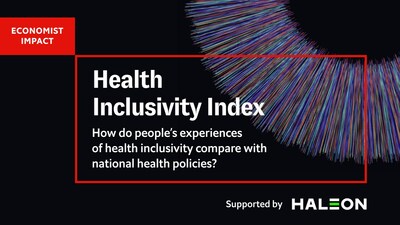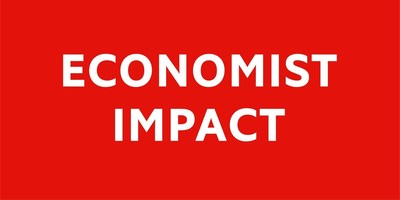Britain falls from top spot in Economist Impact's latest Health Inclusivity Index
- Launch of phase two of the Health Inclusivity Index by Economist Impact showcases a comprehensive evaluation of health inclusivity across 40 countries, supported by Haleon (HLN).
- The index reveals a decline in health inclusivity worldwide, with Britain losing its top spot from phase one, highlighting the importance of effective policy implementation.
- High-income countries exhibit a significant gap between inclusive health policies and citizens' experiences, emphasizing the need for focused efforts to bridge the policy-practice gap.
- Marginalized groups face exclusion in health due to gaps between policy and experience, indicating the necessity for targeted interventions designed in collaboration with the affected populations.
- Over three in five respondents globally experienced barriers to accessing healthcare, with younger individuals more likely to face denial of care and perceive trust and cost as barriers.
- Low- and lower-middle income countries demonstrate greater inclusivity through community-based healthcare services, presenting opportunities for improvement in high-income countries.
- The top ten Health Inclusivity Index rankings highlight the need for significant efforts to embed health inclusivity, with all but one country scoring below 80.
- None.
The second phase of the index, supported by Haleon, assesses governments' efforts across 40 countries to ensure that good health is accessible to all individuals
The index measures health inclusivity, which is defined as the process of removing personal, social, cultural and political barriers that prevent individuals and communities from experiencing good physical and mental health.
Assessing 40 countries against 58 individual indicators across three domains (Health in Society, Inclusive Health Systems and People and Community Empowerment), the index aims to evaluate the health inclusivity policy landscape, the availability of key systems and infrastructure, in addition to efforts to empower individuals and communities to navigate health systems and expand access to marginalised and vulnerable populations.
The second phase of the index incorporates lived-experience and measures the real-world implementation of inclusive health policy through a survey of over 42,000 adults across 40 countries.
The phase 2 Health Inclusivity Index's key findings include:
85% of countries' inclusivity scores deteriorated between phase 1 and phase 2, showing there is a clear gap between policy and implementation. Effective and inclusive health systems require the enactment of strong policy frameworks and the meaningful implementation of these measures in practiceBritain has fallen as the most health inclusive country when health policies are compared with on-the-ground experience. While policy is an important foundation for health, it is the effective implementation of the policies, and people's experience of them, that will reduce inequities and improve health outcomes for populations- High-income countries have large gaps between their inclusive health policies and citizens' experience of them. In contrast, low- and middle-income countries have a smaller difference (the
United Arab Emirates is the only high-income country that does not follow this trend). Although high-income countries have forged ahead in developing and instituting ambitious healthcare policies aimed at inclusion, this push has led to a policy-practice gap that will require focus, effort and resources to close - Marginalised groups face the greatest risk of exclusion in health when gaps between health policy and experience of policy exist. But this is avoidable and requires the implementation of targeted interventions, which should be designed in collaboration with the populations they aim to target
- Over three in five respondents in the global health inclusivity survey experienced barriers to accessing healthcare. The most common barriers include lack of available appointments, distance and cost of travel and lack of trust in healthcare services
- Younger respondents are more likely to say they have been denied access to healthcare and to see trust and cost as barriers to receiving care. Over one-in-five (
21% ) Gen Z and millennial respondents had been denied access to care, compared with14% of older respondents - Low- and lower-middle income countries foster greater inclusivity through community-based healthcare services. Respondents in low- and lower-middle income countries were almost 10 percentage points more likely to have access to the five core services located at the community level considered in the index
The top ten Health Inclusivity Index rankings are as follows:
Jonathan Birdwell, Global Head, Policy & Insights, Economist Impact, says: "Measuring a country's ability to provide quality healthcare involves evaluating its policy but also its population's ability to use their healthcare services. That's why we are pleased to add the lived-experience indicators to Economist Impact's Health Inclusivity Index. The results of this phase of the index show that high-income countries still have a lot of improvements to make if they are to effectively turn their policy into action."
To access the full report please visit: https://impact.economist.com/projects/health-inclusivity-index
About Economist Impact
Economist Impact combines the rigour of a think-tank with the creativity of a media brand to engage a globally influential audience. We believe that evidence-based insights can open debate, broaden perspectives and catalyse progress. The services offered by Economist Impact previously existed within The Economist Group as separate entities, including EIU Thought Leadership, EIU Public Policy, Economist Events, El Studios and SignalNoise.
Our track record spans 75 years across 205 countries. Along with creative storytelling, events expertise, design-thinking solutions and market-leading media products, we produce framework design, benchmarking, economic and social impact analysis, forecasting and scenario modelling, making Economist Impact's offering unique in the marketplace. Visit www.economistimpact.com for more information.
About Haleon
Haleon (LSE / NYSE: HLN) is a global leader in consumer health, with a purpose to deliver better everyday health with humanity. Haleon's product portfolio spans five major categories - Oral Health, Pain Relief, Respiratory Health, Digestive Health and Other, and Vitamins, Minerals and Supplements (VMS). Its long-standing brands - such as Advil, Sensodyne, Panadol, Voltaren, Theraflu, Otrivin, Polident, parodontax and Centrum - are built on trusted science, innovation and deep human understanding.
For more information, please visit www.haleon.com.
![]() View original content to download multimedia:https://www.prnewswire.com/news-releases/britain-falls-from-top-spot-in-economist-impacts-latest-health-inclusivity-index-301993418.html
View original content to download multimedia:https://www.prnewswire.com/news-releases/britain-falls-from-top-spot-in-economist-impacts-latest-health-inclusivity-index-301993418.html
SOURCE Economist Impact
FAQ
What is the Health Inclusivity Index?
What are the key findings of the second phase of the Health Inclusivity Index?
What are the top ten Health Inclusivity Index rankings?









